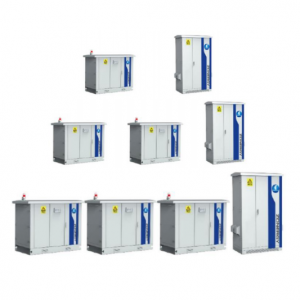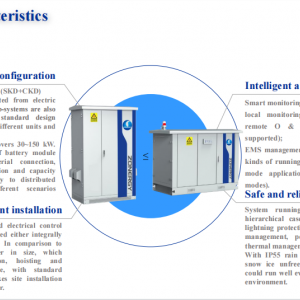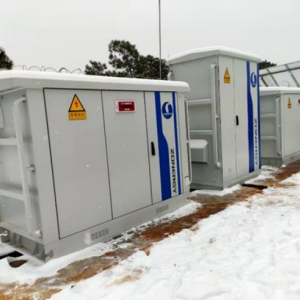
Off On Grid Energy Storage Systems
The off on grid PV power generation system is widely used in places where there are frequent power outages, or where the PV self-generated power cannot be put online, where the price of self-consumption power is much more expensive than the price of grid-connected power, and where the price of peak power is much more expensive than the price of trough power.
The system consists of photovoltaic modules, solar grid-connected integrated machine, battery, load, etc. The photovoltaic array converts solar energy into electricity when there is light, and supplies power to the load through the solar control inverter and charges the battery at the same time; when there is no light, the battery supplies power to the solar control inverter and then supplies power to the AC load. Compared with grid-connected power generation system, this system has added charge/discharge controller and battery, so that the PV system can continue to work when the power grid is out, and the inverter can switch to off-grid working mode to supply power to the load.

Features:
●Separate cabinet design, divided into electric control cabinet and battery cabinet, convenient for transportation
●One electric control cabinet supports 1~3 battery cabinet access, which is convenient for the configuration of different backup points.
●Outdoor design, meet IP55 protection level
●Each battery cabinet has independent fire-fighting system and air-conditioning system, high safety
●With isolation transformer output, safe and reliable
Scopio 30KB-T1~Scopio 50KB-T1 | ||
Technical parameters: | Scopio30KB-T1 | Scopio50KB-T1 |
Inverter scalability of electric control cabinet | ||
Power scalability | 30kW /60kW /90kW | 50kW /100kW/150kW |
Energy scalability | 118 kWh~1062kWh(118*n,n=1~9) | |
Number of product assortment | >20 | |
Basic parameters of the inverter | ||
Weight of a single unit | 440 kg | 720 kg |
Dimension of a single unit (mm) | 800*800*1900 | |
Inverter photovoltaic input parameters | ||
Maximum photovoltaic power | 60/120 kw | |
Start-up voltage | 150 V | |
Maximum photovoltaic voltage | 1000V | |
Voltage range | 150V-1000V | |
MPPT voltage range / rated voltage | 200V-850V | |
Number of MPPT input circuits | 1/2 | |
AC output parameters (grid) | ||
Rated apparent power | 33 kVA | 55 kVA |
Rated active power | 30 kw | 50 kw |
Maximum output current | 43A | 72A |
Nominal AC output voltage | 400 V/320 V~460V | |
Nominal grid frequency | 45-55/55-65Hz | |
Power Factor at rated power | 1 | |
Power Factor | 0.8leading...0.8lagging | |
THDi | <3% | |
AC system | 3W+N+PE | |
lsolation transformer | available | |
AC output parameters (off-grid) | ||
Maximum apparent | 33 kVA | 55 kVA |
Rated active power | 30 kw | 50 kw |
Rated output frequency | 50/60 Hz | |
Automatic switching time | <0.5 S | |
THDU | ≤2% linear | |
Rated frequency | 50/60 Hz | |
Overload capacity | 110%-10 minutes,120% - 1 minute | |
Parameters of a single battery cube | ||
Model | ZSXH-BX-132280 | |
Assortment scheme | 1P 132S | |
Total voltage/capacity of a single battery cabinet | 422 V/280 Ah | |
Voltage range | 382.8 V-475.2V | |
Nominal energy of a single battery cabinet | 118 kWh | |
Weight of a single battery cabinet | 1550 kg | |
Dimension of single battery cabinet (mm) | 2470*1070*1700 | |
Battery cabinet assortment mode | parallel connection | |
Battery type | lithium ion battery | |
System parameter | ||
Degree of protection | IP55 | |
Number of cycles | >6000 times | |
Calendar life | 10 years | |
Certification | IEC61683CE(EC62109),IEC62116,IEC61727,IEC62619,UN38.3,GB/T 36276-2018 | |
Working temperature | charging 3 ~ 55 C; discharging - 20 ~55C | |
Altitude for product operation | 5000m (Sstem capacity reduction occurs when the altitude for product application rises above 3000 meters.) | |
Note: Technical parameters listed hereunder are for reference only. Actual parameters shall be subject to products shipped. | ||

Connected/off-grid photovoltaic power plants in remote areas
To solve power consumption in remote areas, the energy storage cabinet is the core to build a parallel/off-grid photovoltaic power station. The power station is independent or complementary to the grid to supply power to the load. Provide a modular distributed standard solution for this model, reduce the difficulty of power station construction, and realize the configuration capacity stepping and support the expansion of cabinets according to the demand capacity of the power station.




